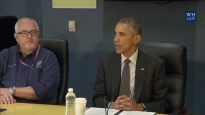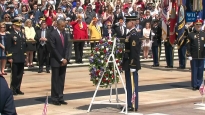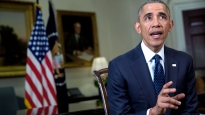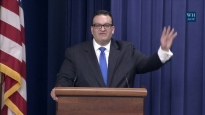President Obama & Poets at the White House
May 11, 2011 | 44:55 | Public Domain
President Obama speaks and is joined by renowned poets reciting their work for a celebration of poetry at the White House.
Musical performances may be excluded from on-demand video due to licensing and intellectual property limitations.
Remarks by the President at Evening of Poetry at the White House
7:14 P.M. EDT
THE PRESIDENT: Hello, everybody. Please have a seat. Welcome to the White House. I am going to be brief, because on a night like tonight my job is to get out of the way and let the professionals do their job.
I do want to start by thanking our extraordinary performers for taking time out of their busy schedules to be with us. I also want to recognize the President’s Committee on the Arts and the Humanities for putting on this event and for everything they do to support the arts. (Applause.)
The power of poetry is that everybody experiences it differently. There are no rules for what makes a great poem. Understanding it isn’t just about metaphor or meter. Instead, a great poem is one that resonates with us, that challenges us and that teaches us something about ourselves and the world that we live in. As Rita Dove says, “If [poetry] doesn’t affect you on some level that cannot be explained in words, then the poem hasn’t done its job.” Also known as, it don’t mean a thing if -- (laughter) -- it ain’t got that swing. That’s a little ad-lib there. (Laughter.)
For thousands of years, people have been drawn to poetry in a very personal way -– including me. In the spirit of full disclosure, I actually submitted a couple of poems to my college literary magazine, and you will be pleased to know that I will not be reading them tonight. (Laughter.)
But as a nation built on freedom of expression, poets have always played an important role in telling our American story.
It was after the bombing of Fort McHenry during the War of 1812 that a young lawyer named Francis Scott Key penned the poem that would become our National Anthem. The Statue of Liberty has always welcomed the “huddled masses yearning to breathe free.” Soldiers going off to fight in World War II were giving -- given books of poetry for comfort and inspiration. And whenever our nation has faced a great tragedy -– whether it was the loss of a civil rights leader, the crew of a space shuttle, or the thousands of Americans that were lost on a clear September day -– we have turned to poetry when we can’t find quite the right words to express what we’re feeling.
So tonight we continue that tradition by hearing from some of our greatest -– as well as some of our newest -– poets. Billy Collins, who is here with us, calls poetry “the oldest form of travel writing,” because it takes us to places we can only imagine. So in that spirit, I’d like everyone to sit back, or sit on the edge of your seats, and enjoy the journey.
Thank you very much. (Applause.)
END
7:17 P.M. EDT
|
May 31, 2016
|
May 31, 2016
|
May 31, 2016
|
May 31, 2016
|
|
May 30, 2016
|
May 30, 2016
|
May 28, 2016
|
May 27, 2016
|
- &lsaquo previous
- …
- 45
- 46
- 47
- 48
- 49
- 50
- 51
- 52
- 53
- …
- next &rsaquo







